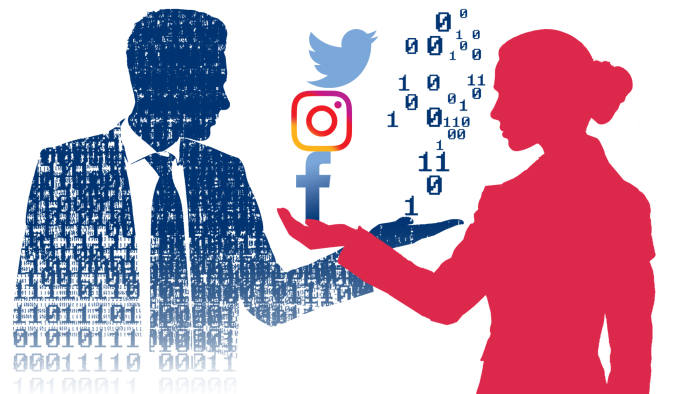How Big Tech brought back the barter economy
‘What consumers and tech companies have essentially been doing is bartering services for personal data’
Gillian Tett

Seven years ago, after the financial crisis, anthropologist David Graeber published a provocative book. Debt: The First 5,000 Years challenged how economists think about debt, credit and barter.
Graeber argued that economists tended to assume financial history had moved in a neat evolutionary line: first, so-called primitive people engaged in barter (swapping food for cloth, say); then they adopted money (think ancient gold coins); last, they embraced debt (aka modern banks, mortgages and credit cards). While this picture seems appealingly easy to understand, Graeber insisted that it was completely wrong. He pointed out that simple, ancient societies had complex systems of credit and barter that did not vanish when money appeared. To put it another way, history does not always move in one direction — barter, credit and money can, and do, coexist.
It is an idea we urgently need to rediscover, but this time in relation to Big Tech. In recent weeks, there has been an uproar about the revelations that large tech companies such as Facebook and Google have been harvesting consumer data for commercial ends.
At first glance, this looks exploitative. But in exchange for giving up their data, consumers have received something — digital services such as messaging systems, maps, information and apps. Indignant techies love to point out that consumers have been given these services “for free”, since there is often no monetary payment involved; meanwhile, politicians (and consumer groups) complain that tech companies have taken consumer data “for free” too.
Perhaps a better way to frame these transactions is to revive that ancient term “barter”. Silicon Valley chief executives often describe themselves as visionary pioneers, creating innovative models for doing business, but what consumers and tech companies have essentially been doing is bartering services for personal data — in the same way that hunter-gatherers might have bartered berries for meat. We might have thought that the 20th-century economy was built on money, but the early 21st-century cyber economy is partly based on barter too.
Does this matter? An anthropologist might say no. But most policy makers, business leaders and consumers would beg to differ. For one thing, the exact nature of what was being bartered here — the sheer volume of data being hoovered up by tech companies and their reach into our most personal messages, preferences and political views — was arguably not known by consumers. Few of us have the time or legal expertise to fully read or comprehend the lengthy terms and conditions that flash up before we can access digital services.
It it also fair to say that our leaders, laws and economic models are not set up to cope with a world where barter is much more than a historical curiosity. Economists, for example, do not have any real way to include barter in their view of the economy, since they tend to measure everything according to price. “Free” items, such as apps or data exchanges, are largely ignored in the data on gross domestic product. Lawyers do not know how to cope with barter when it comes to discussing issues of antitrust or the abuse of monopoly power, since the US concept of antitrust and collusion presumes that the way to measure consumer exploitation is to see whether they have been charged excess prices — as measured with money.
---------------
Meanwhile, consumers have not been offered an alternative to the barter trades that drive the digital economy — or the chance to consider how they might structure them differently. Is it “unfair” if Facebook (or anyone else) grabs all your data in perpetuity in exchange for letting you have free social media? Does this barter actually represent good value? And is there a way to have gradations on this exchange — and enable consumers to drive a better bargain?
Thankfully, a debate about this is — belatedly — starting. Policy makers in Europe are limiting the data that tech companies can take. Meanwhile, some tech entrepreneurs and data scientists are trying to introduce more clarity — and money — into these barters by campaigning for consumers to be given proper ownership of their “digital assets” (ie data), so that they can “sell” these in clear-cut transactions.
In many ways, this sounds sensible — and if we did ever turn this barter into a sale, it would mark another swing of history. But there are some big impediments: will consumers pay money for cyber services? Can blockchain, an electronic database for transactions, really act as a ledger for data? Would governments ever introduce the legislation needed to make this work?
For now we are left in limbo: our laws and models assume we have a money-based world; but our mobile phones and laptops operate with barter trades we barely understand. If nothing else, this shows that it is time to take a broader and, dare I say it, anthropological vision of the economy. Money alone does not always make the world go round, least of all in the tech world.
0 comments:
Publicar un comentario